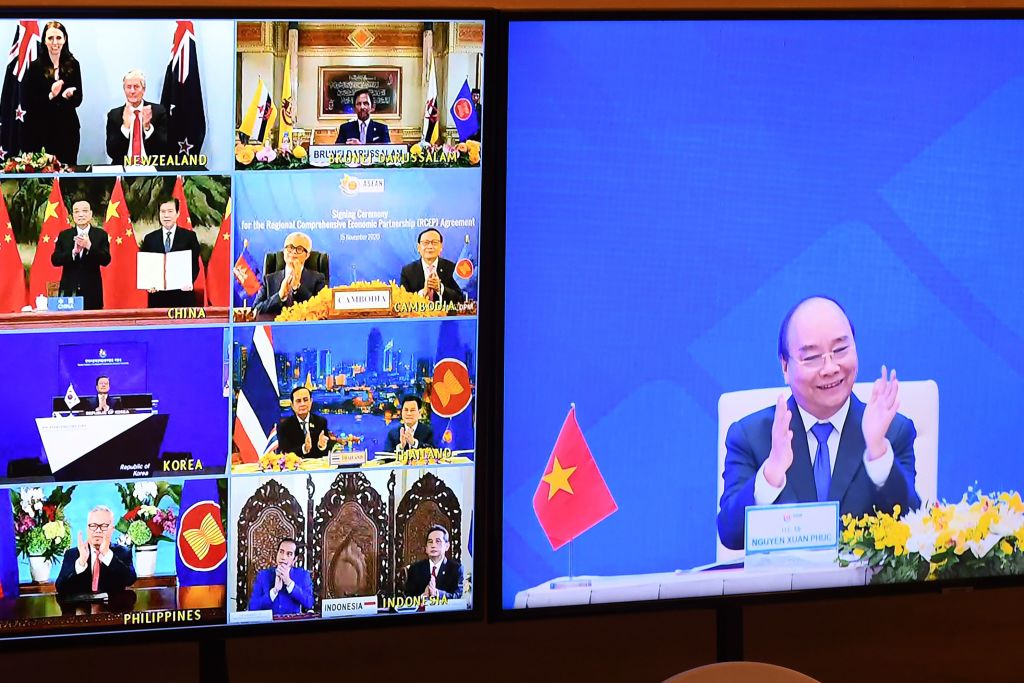Will new Asia-Pacific pact force Biden's hand on trade?


A free daily email with the biggest news stories of the day – and the best features from TheWeek.com
You are now subscribed
Your newsletter sign-up was successful
Leaders from 15 Asia-Pacific nations on Sunday signed what analysts have said by some measures is the largest free trade agreement in history. The 10 members of the Association of Southeast Asian Nations joined up with Australia, China, Japan, New Zealand, and South Korea to cement the pact, which could add nearly $200 billion to the global economy by 2030, according to some estimates.
While The Financial Times described the Regional Comprehensive Economic Partnership as a "fairly shallow agreement" that is not expected to lead to large overall tariff reductions, it's still considered a step toward making Asia a more coherent trading zone, akin to the European Union.
But what could it mean for the United States? The U.S. has taken a step back from global trade under President Trump's preferred protectionist policies, which led to a withdrawal from the controversial Trans-Pacific Partnership. Yet Japan, for one, hopes that the RCEP agreement, will inspire the incoming Biden administration to jump back into the fray. The president-elect, however, has remained non-committal to entering new trade pacts, which have sparked bipartisan discontent in recent years. He instead seems likely to set his focus on domestic economic revitalization, at least during the early part of his Oval Office tenure.
The Week
Escape your echo chamber. Get the facts behind the news, plus analysis from multiple perspectives.

Sign up for The Week's Free Newsletters
From our morning news briefing to a weekly Good News Newsletter, get the best of The Week delivered directly to your inbox.
From our morning news briefing to a weekly Good News Newsletter, get the best of The Week delivered directly to your inbox.
That means China could assert itself even more as the leading voice on regional trade matters in the Indo-Pacific, especially because India is absent (for now) from the new agreement, as well, FT reports. Jennifer Hillman, a senior fellow for trade and international political economy at the Council on Foreign Relations, told The New York Times she believes that, despite Biden's priorities, "there are going to have to be some responsive actions to what China is doing" because "the rest of the world is" probably not going to wait for the U.S. to get "its house in order." Read more at The Financial Times and The New York Times.
A free daily email with the biggest news stories of the day – and the best features from TheWeek.com
Tim is a staff writer at The Week and has contributed to Bedford and Bowery and The New York Transatlantic. He is a graduate of Occidental College and NYU's journalism school. Tim enjoys writing about baseball, Europe, and extinct megafauna. He lives in New York City.
-
 The problem with diagnosing profound autism
The problem with diagnosing profound autismThe Explainer Experts are reconsidering the idea of autism as a spectrum, which could impact diagnoses and policy making for the condition
-
 What are the best investments for beginners?
What are the best investments for beginners?The Explainer Stocks and ETFs and bonds, oh my
-
 What to know before filing your own taxes for the first time
What to know before filing your own taxes for the first timethe explainer Tackle this financial milestone with confidence
-
 TikTok secures deal to remain in US
TikTok secures deal to remain in USSpeed Read ByteDance will form a US version of the popular video-sharing platform
-
 Unemployment rate ticks up amid fall job losses
Unemployment rate ticks up amid fall job lossesSpeed Read Data released by the Commerce Department indicates ‘one of the weakest American labor markets in years’
-
 US mints final penny after 232-year run
US mints final penny after 232-year runSpeed Read Production of the one-cent coin has ended
-
 Warner Bros. explores sale amid Paramount bids
Warner Bros. explores sale amid Paramount bidsSpeed Read The media giant, home to HBO and DC Studios, has received interest from multiple buying parties
-
 Gold tops $4K per ounce, signaling financial unease
Gold tops $4K per ounce, signaling financial uneaseSpeed Read Investors are worried about President Donald Trump’s trade war
-
 Electronic Arts to go private in record $55B deal
Electronic Arts to go private in record $55B dealspeed read The video game giant is behind ‘The Sims’ and ‘Madden NFL’
-
 New York court tosses Trump's $500M fraud fine
New York court tosses Trump's $500M fraud fineSpeed Read A divided appeals court threw out a hefty penalty against President Trump for fraudulently inflating his wealth
-
 Trump said to seek government stake in Intel
Trump said to seek government stake in IntelSpeed Read The president and Intel CEO Lip-Bu Tan reportedly discussed the proposal at a recent meeting
